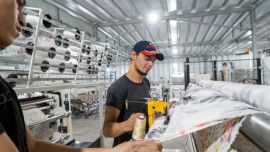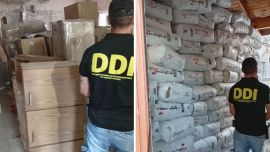As the destruction of the Amazon rainforest and Pantanal wetlands bruise Brazil's international image, bankers, business executives and even agribusiness firms are calling for a greener economy, adding to pressure on President Jair Bolsonaro.
Bolsonaro, a far-right climate-change sceptic, has called environmental groups a "cancer" for attacking his policies, which include pushing for protected lands to be opened to mining and agriculture in the world's biggest rainforest. But he has been forced to respond more cautiously as international investors, powerful voices in the business world, and agribusiness giants such as JBS and Cargill have joined in the criticism.
In keeping with tradition, the Brazilian leader will give the first speech to the United Nations General Assembly Tuesday, delivered remotely due to the coronavirus pandemic. Last year, Bolsonaro used the forum to condemn news on the fires ravaging the world's biggest rainforest as "media lies."
This year's speech will again touch on the Amazon, though the goal will be "to show everything we're doing" to protect it, said Vice-President Hamilton Mourão, the head of the government's task force on fighting Amazon deforestation.
'Window of opporunity'
With countries around the world trying to chart the future of their post-pandemic economies – not least Brazil, the country with the second-highest Covid-19 death toll after the United States – now is the perfect time for Latin America's biggest economy to go green, said Paulo Branco, head of the Development Frontiers Institute.
"We have a great window of opportunity, and we have to take advantage of it to push for a sustainable reboot of the economy," he told AFP.
"With our huge green potential, an 'agri-environmental' agenda is the way to a faster recovery," said Marcello Brito, of the Brazil Climate, Forests and Agriculture Coalition.
His group, an unprecedented alliance of 230 environmental groups and Brazilian agribusiness companies, sent an open letter last week to Bolsonaro urging him to do more to fight deforestation in the Amazon.
In June, 29 global investment firms managing nearly US$4 trillion in assets also sent an open letter to Bolsonaro, urging him to change policies blamed for accelerating the destruction of the rainforest.
Environmental destruction by Brazilian firms is also threatening a long-sought trade deal between the European Union and the Mercosur bloc, of which Brazil is a member.
So far, the president has continued to publicly deny the impact of the record Amazon deforestation on his watch.
"Brazil is the country that does the most to preserve the environment," he said last week, even as record-shattering fires tore through the Pantanal, the world's biggest tropical wetlands, and deforestation in the Amazon for January to August came in just five percent shy of last year's all-time high.
But there are signs he is starting to feel the pressure – including naming the Amazon task force headed by Vice President Mourão and deploying the Army to the rainforest to fight wildfires.
Redirecting investment
"It's unfortunate that the environment issue has become so ideological," said Shigueo Watanabe, a researcher at the ClimaInfo Institute.
"I don't defend the environment just because I like trees. I do it because I want the country's economy to grow, and to do that you need agribusiness," he said.
"If we destroy the Amazon, we'll destroy Brazilian agribusiness," he added, referring to the devastating climate impact that scientists say the collapse of the rainforest ecosystem would cause across the region and the world.
Greening the Brazilian economy could create two million jobs and add 2.8 trillion reals (US$530 billion) to gross domestic product by 2030, according to a recent report by the World Resources Institute.
"Brazil would actually grow more with a green recovery than under its current development model," said the institute's Viviane Romeiro.
"It doesn't mean a total break with the past.... It's about redirecting investment and expanding best practices in the infrastructure, agriculture and industrial innovation sectors."
It is an issue that will increasingly touch all sectors of the economy.
"Companies will no longer make big profits with no regard for their environmental impact," said Denise Hills, global head of sustainability at Brazilian cosmetics giant Natura, a trailblazer in the field.
"This is an essential issue to the new generation of consumers."
by Paula Ramon, AFP
























Comments